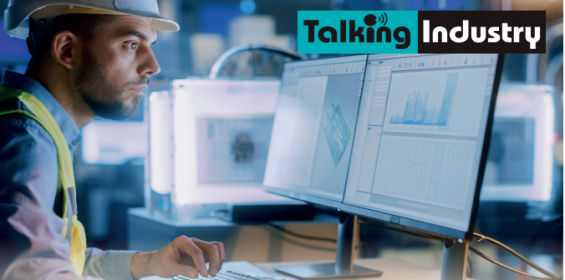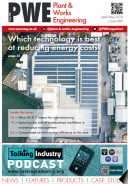Talking Digitalisation in Manufacturing
Published: 21 September, 2022
While an increasing number of enterprise companies and some SMEs are adopting digitally transformative technology, the UK continues to fall behind other nations, including the US and Germany. Andy Pye chaired an international panel to explore the trends
Line Vaes is the Marketing Manager of Priority Software, a company which specialises in affordable ERP systems for growing companies. She has a deep overall knowledge of ERP for the manufacturing industry and spoke on how to use ERP as a platform to open the door to real connectivity, as well as the importance of mobile communications for field service teams and production floor operatives.
Regular panelist Michaël Lefeuvre is Product Manager Europe for Red Lion Controls, responsible for Industry 4.0 and industrial communications. He covered how to increase data consistency and data quantity to increase accuracy. This includes avoiding manually entered data in multiple systems, so as to remove human inaccuracy and ensuring no incorrect, interpreted, forgotten and estimated reported data.
Thomas Schardt is Vice President, Digitalisation - Strategy - Innovation - Blue Ocean at Nidec Motor. Based in the Greater St. Louis Area, Missouri, his role is to develop, implement and execute transformational plans delivering top and bottom-line results, expanding into emerging and mature markets. He has a successful track record in structuring startups to expand market presence and in turning around challenged organisations.
And making his second appearance on Talking Industry, Tony Coghlan is Managing Director of Turck Banker Ltd. Before Turck Banner, Tony worked at Siemens Automation and Drives, Siemens Transportation, and served in the Royal Australian Navy as an Avionics Engineer. His experience spans various technologies and industries, which allows him to focus on the complete business operation, through digital transformation and the introduction of IoT applications for industrial markets.
Digitalisation’s pain points
Thomas Schardt explained that Nidec builds motors and control systems for anything that spins and moves, from cell phones to those in larger control systems, such as for pumps for utility water supply, or wind tunnels for NASA. As part of a digital journey, IoT is extremely important. What are the benefits, the value add?
How to integrate partners and clients. "In this digitalisation world, there are new business models, new processes, new transparency, new insights, new interactions with customers and partners, new actions to take and this these all need to be identified, defined and implemented. It is not always a comfortable feeling. My personal focus lies on transforming manufacturing into a more integrated enterprise. You can call that smart factory plus - how to monetise your knowledge and why it doesn't always work?
"The key is to focus on specific aspects - the low hanging fruit. Often a good place to start is smart maintenance (asset management and predictive maintenance). Other starting points may be product development, inventory management, the supply chain - there are so many smart things to do.
"So choose your priority, address your pain points. But overall, to start the journey, start small, learn, adapt, and then scale."
Tony Coghlan said that the pain points vary from customer to customer. "We see a lot of the pain points arising from machines that are old. They are often unsure where to start, what data to collect and how to collect it, and are concerned that there may be a large cost. We are trying to get people on that journey at a very low cost. That said, people are starting to adapt and are prepared to throw more resources at it."
Michael Lefeuvre acknowledged the importance of getting the adoption of smart technologies by the people. "We always manage the technical issues OK - how we get the data from the machine and where to send it. But it is easy to forget the people - adoption doesn't work if the new system is too different to what they are used to. If everybody in the organisation has to change their daily working practices, it will never work."
Line Vaes believes that even when companies realise they need to invest in new technology, they do not see the need to join it all together. "When we go to the actual daily business, we see that a lot of these systems and new technologies are not integrated. So there are have separate systems with separate silos of data, which don't communicate with each other. Data has to be entered two or three times, which can also cause errors, and valuable time is lost. Adopting the new technology is a good thing, but get the best benefit, you need to make sure that it's connected and integrated into the entire environment.
"The key is finding a platform that is open enough, that gives you a future proof technology to make sure that you can change and integrate other systems. You don't need to change your entire systems on Day One, do it Step by Step, department by department. But you need to make sure that technology is open enough to connect all the new technologies, to make sure that you have one database to manage."
Andy Pye asked the panel how users should cope with the need to have an overall vision before they start.
Thomas Schardt acknowledged that that they struggle with that, and it is often hard to visualise where you want to end up on the digitalisation journey and often almost impossible. Again, identifying pain points and going step by step is the common approach. "Digitalisation refers to the changing digital landscape, the support processes and tasks, the strategic use of technologies and using multiple automation technologies to really keep pace with changing customer expectations and economic conditions.
"Nowadays, customers' expectations change much more often, and at much faster pace. And this is in response to widespread advancements in machine learning and cloud computing. As Line said, and I believe too, you don't want to be too siloed. Because all these individual siloed programs, if you can't connect them, that's a big loss of potential. Michael mentioned the importance of people - if people don't buy in, you have resistance, passive or active. That's also my experience, you need to be to get the people on board rather quickly and show them the benefits. With digitalisation, people fear they're going to be replaced. Yet, that doesn't need to be a major criterion in the cost savings."
Audience poll
For the first time, we conducted a delegate poll. It showed that only 10% of the audience are in the advanced category. 48% are at the beginning, 14% haven't started, with the remaining 28% being sort of middle of the road. So do those figures surprise anybody? Tony Coghlan was surprised that the figure of how many considered themselves to be at the advanced stage was as high as 10%! "No, it's quite common. People have a lot of data available to them, but they just don't know how to use it, integrate it or how to put it into a single viable solution."
Michael Lefeuvre agreed, pointing out that before the COVID barrier the journey had usually not been started most of the time. He reports an evolution in the adoption of digitisation over the three years.
Lina Vaes also agreed. She said that CoVID and (in the UK) Brexit have led to an acceleration in the adoption of digital technology. When 10 years ago, she said, almost most of ERP systems were sold to big multinational companies. Now, she sees a serious shift going to the SME community.
Thomas Schardt, too, was not surprised and thought the audience result were a little bit on the high side. "I would say most companies are at a very, very early stage to really use the benefits. Manufacturing is a very traditional environment."
On demand, Podcasting, Linkedin
Talking Industry is also available on demand, not just to those who've registered, but also anybody who didn't make it, or missed the announcements.
We are now also offering Talking Industry as a podcast so you can listen to us on the go. The podcasting link is below and we are available on all major outlets, including Spotify, iTunes, and Apple Music.
Because there are a few unfinished threads, and definitely some questions for individual speakers as well, we also invite panelists and attendees to come on to our Talking Industry LinkedIn platform for more discussion.
Speakers
Line Vaes, Marketing Manager, Priority Software
Michaël Lefeuvre, Product Manager Europe, Red Lion Controls
Thomas Schardt, Vice President, Digitalization - Strategy - Innovation, Blue Ocean at Nidec Motor
Tony Coghlan, Managing Director, Turck Banner Ltd
Talking Industry Podcasts: https://talkingindustry.podbean.com/
Talking Industry LinkedIn: https://www.linkedin.com/company/69516213







